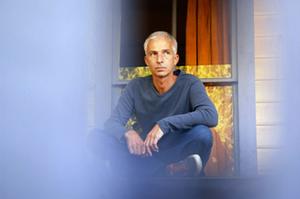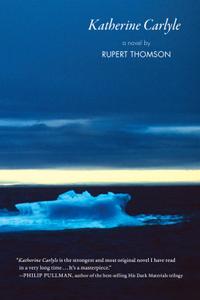
|
|
| photo: Alan Pryke | |
Since Rupert Thomson published his first novel, Dreams of Leaving, in 1987, he has written eight novels, including The Insult, which was shortlisted for the Guardian Fiction Prize, and chosen by David Bowie as one of his 100 Must-Read Books of All Time; Death of a Murderer, shortlisted for the Costa Prize; and The Book of Revelation, made into a feature film by the Australian writer/director Ana Kokkinos. In 2010, Thomson published a memoir, This Party's Got to Stop, which won the Writers' Guild Non-Fiction Book of the Year. According to Philip Pullman, Thomson's new novel, Katherine Carlyle (Other Press, October 6, 2015), is "the strongest and most original novel I have read in a very long time.... It's a masterpiece." Thomson has contributed to the Financial Times, the Guardian and the Independent, and lives in London.
On your nightstand now:
On my nightstand are Baudelaire's Collected Poems, which is a gift from my U.S. publisher; Days of Abandonment, a novel about the breakdown of a marriage by the Neapolitan writer Elena Ferrante; Choices, a memoir by the actress Liv Ullmann (who I met last year, and who signed the book for me!); Madness, Rack, and Honey, a book of lectures on poetry by Mary Ruefle; Drawing Surrealism, which is edited by Leslie Jones, because I sometimes look at images before I go to sleep, and because I'm researching the Surrealist movement; In a Strange Room, a novel about three different forms of love, by the South African writer Damon Galgut; and On the High Wire, by the French tightrope-walker Philippe Petit, which is both a meditation on his craft and a kind of manual for living.
Favorite book when you were a child:
Tess of the D'Urbervilles by Thomas Hardy. I read all Hardy's novels when I was young, starting when I was 11 or 12. I was obsessed with his work. Aged 15, I rode all the way from my house to Hardy's house on my bicycle, a journey of 150 miles.
Your top five authors:
Patrick Modiano, Jean Rhys, Isak Dinesen (Karen Blixen), Jayne Anne Phillips and James Salter.
Book you've faked reading:
I sometimes pretend I've read Moby-Dick. It's a lie. I've probably started it three or four times, but never seem to get beyond the first 50 pages.
 Book you're an evangelist for:
Book you're an evangelist for:
I used to evangelize about Michael Ondaatje--I can't count the number of copies of Coming Through Slaughter I have given to people--but after he won the Booker Prize for The English Patient he no longer needed my help. Since then, I have done the same with books by Desmond Hogan, Mary Gaitskill, Denton Welch, Yoko Ogawa and Denis Johnson.
Book you've bought for the cover:
I fell for Chronicle of the Guayaki Indians the moment I saw it. Written by Pierre Clastres, translated by Paul Auster and published by Zone Books, it is a detailed record of an encounter with a Paraguyan tribe that has now vanished. That said, I could probably have bought almost anything published by Zone Books. Their covers are famously exquisite.
Book that changed your life:
This may sound strange, but the book that changed my life is one I wrote myself. My memoir, This Party's Got to Stop, helped me to heal the rift with my youngest brother. When I embarked on the book, I hadn't seen him for 23 years, but we're now back in contact, and even though he lives in Shanghai, we talk or write to each other most days. The other book that changed my life is my first novel, Dreams of Leaving. If I hadn't written it, I wouldn't have met my wife. But that's another story.
Favorite line from a book:
Can I have a paragraph? It's from Light Years by James Salter, and it's about a parent's love for a child.
"Of them all, it was the true love. Of them all, it was the best. That other, that sumptuous love which made one drunk, which one longed for, envied, believed in, that was not life. It was what life was seeking; it was a suspension of life. But to be close to a child, for whom one spent everything, whose life was protected and nourished by one's own, to have that child beside one, at peace, was the real, the deepest, the only joy."
Which character you most relate to:
I identify with Marlow, the narrator in Joseph Conrad's Heart of Darkness. He's a storyteller, an observer and a traveler. He's mysterious, elusive. He has seen extraordinary things.
Book you most want to read again for the first time:
My first reading of One Hundred Years of Solitude, in my early 20s, was a eureka moment (if a eureka moment can last 400 pages). It changed the way I looked at the world. It also changed my view of what could be written. Magical realism is sometimes dismissed as being fantastical or overblown; this misses the point. What magical realism does, at its best, is to see the marvelous in the everyday.
Ten books you wish you'd written:
Song of Solomon by Toni Morrison, Gravity's Rainbow by Thomas Pynchon, Wise Blood by Flannery O'Connor, Fruits of the Earth by André Gide, The Third Policeman by Flann O'Brien, As I Lay Dying by William Faulkner, Journey to the End of the Night by Louis-Ferdinand Céline, The Tin Drum by Günter Grass, Housekeeping by Marilynne Robinson and The Master and Margarita by Mikhail Bulgakov.

